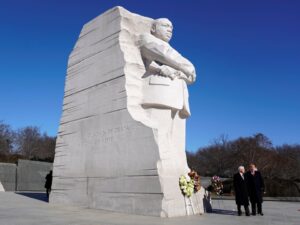“I have a dream.”
Everyone has heard those words from Martin Luther King Jr.’s speech. “Dream” is another word for vision. It describes a view.
What if Martin Luther King Jr. had not had the vision outlined in his most famous speech? “I have a dream that my four little children will one day live in a nation where they will not be judged by the color of their skin, but by the content of their character. I have a dream that one day this nation will rise up and live out the true meaning of its creed: we hold these truths to be self-evident, that all men are created equal.”
- It’s okay to pursue your dreams, even if you face pushback.
The vision or dream one has restrains from other distractions. It allows an individual to focus on what really matters. In life, there are incredible options to choose from, especially as a young person.
Just think about it. How many times have you been asked, “So what are your career goals? What is your dream job? What do you want to do after you graduate? What do you want to do with your life?” Questions like these often become annoying and frustrating because young people sometimes have difficulty answering them for themselves, let alone articulate a clear answer to friends and family. Having the proper vision of where you are called to be right now is key. It’s not just what is seen, but how you see it.
- Don’t let your present circumstances limit you.
Martin Luther King, Jr. said it aptly, “No one really knows why they are alive until they know what they’d die for.” This famous civil rights leader reminds us to refuse to have a circumstantial view. This is how people typically see themselves– according to their circumstances – but doing so can be dangerously limiting. Consider King’s life. He could have let his ethnicity limit him or discourage him from pursuing his dream of racial equality for all. As millennials, we could let our genetic makeup or our age hold us back from following our dreams or pursuing our calling. Our future then becomes a slave of our past.
In contrast to a circumstantial view, embrace a providential view. This is viewing ourselves as God sees us, and is amazingly empowering. It affects how we face challenges and determines whether we emerge as a victim of our circumstances or as victor over our circumstances. Destiny in disguise often comes in the form of a problem.
- Keep moving forward.
Dr. King noted that “Life’s most persistent and urgent question is, what are you doing for others?” Not only should we leverage difficulties we encounter to our advantage, but after experiencing defeat or setbacks we are better equipped to be successful the next time around. Defeat the first time around should not discourage us either. “If you can’t fly, then run. If you can’t run, then walk. If you can’t walk, then crawl. But whatever you do, you have to keep moving forward.” Extremely wise words from Dr. King, who certainly faced tremendously discouraging setbacks. It is also important to remember that after facing challenges, we can also be in a better position to encourage others who go through similar hardships or who face similar challenges.
Martin Luther King, Jr. was a man who stepped out of his circumstantial view and into a providential view. His goal wasn’t to make a name for himself or to one day have a federal holiday in his honor. Those things were outcomes of his persistence in pursuing his God-given dream. Overcoming the obstacles that he faced certainly wasn’t easy or fun. However, today we celebrate his legacy because of the incredible way he used the tumultuous circumstances to his advantage.
- Do what’s right.
As Dr. King detailed, “On some positions, Cowardice asks the question, ‘Is it safe?’ Expediency asks the question, ‘Is it politic?’ And Vanity comes along and asks the question, ‘Is it popular?’ But Conscience asks the question ‘Is it right?’ And there comes a time when one must take a position that is neither safe, nor politic, nor popular, but he must do it because Conscience tells him it is right.”
This is an important aspect of Dr. King that isn’t talked about enough. Today, expect silence from the media about the “Reverend” Martin Luther King Jr. You won’t hear that his undergrad was in Bible studies & his Ph.D. was in theology. You won’t hear pundits talking about how the night before Dr. King was assassinated in April of 1968, he gave a speech at a church that included over a dozen Biblical references. Dr. King’s unshakable faith and determination to “do the right thing” is what made him ultimately successful. Love was at the center of Dr. King’s message. He always preached nonviolence and carried himself with dignity no matter the circumstances. If Dr. Martin Luther King Jr. were alive today, he would tell you his life and legacy would be impossible without his faith and devotion to God.
As we honor the legacy of Dr. Martin Luther King, Jr., my challenge to millennials today is to encourage them to use their skills, opportunities, and yes, even their difficulties to rise above life’s challenges. Do hard things, but more importantly, do the right thing. You may be the next champion of a beautiful and noteworthy cause, if only you would embrace the proper perspective of yourself and your circumstances. You too, can not only have a dream, but also can see that dream accomplished.




